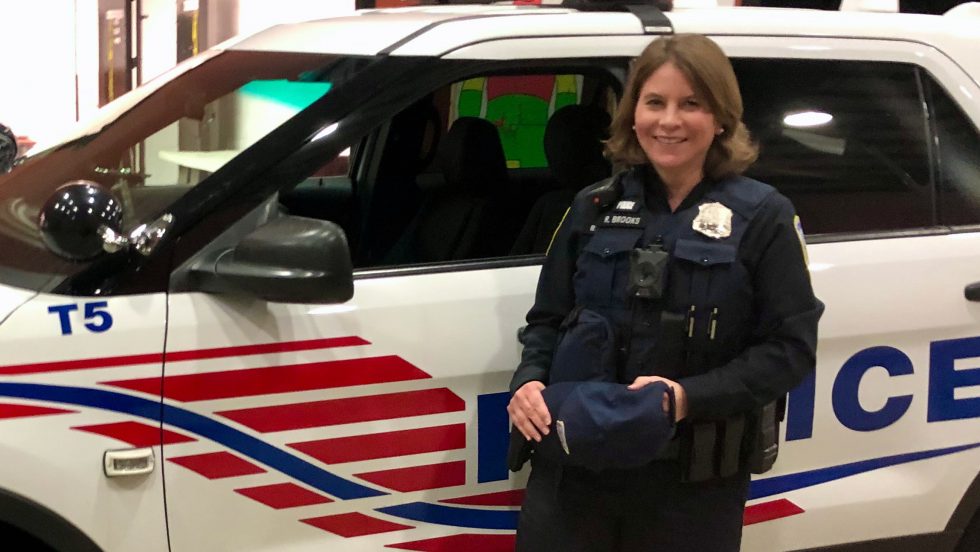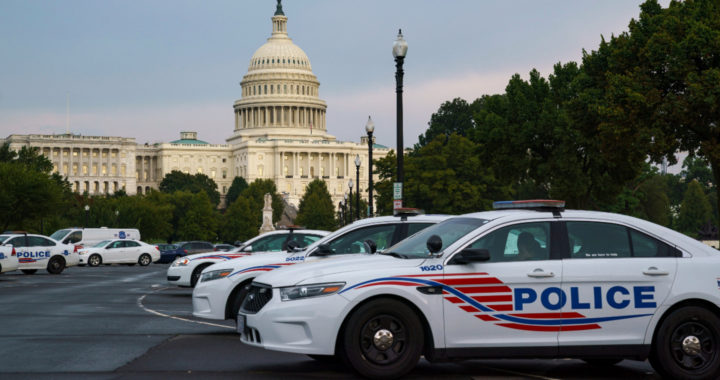On her first night as a reserve police officer in Washington DC’s poverty-wracked Seventh District, Rosa Brooks’ training officer told her, “Everyone around here would be happy to kill you. These people hate you. They would dance around your dead body.”
Brooks wasn’t convinced, and nothing she saw in her four years as a police officer led her to agree. By the end of her time on the job, she would rue the failure of American society to address the hopelessness and poverty that afflict large sections of America, the burden that failure has placed on the police, and the disproportionate weight of the American criminal justice system on the poor.
But mostly she would recognize the untenable situation that many police officers face every day: surrounded by disinvestment and despair, unequipped and unprepared to make lasting changes, and tasked to maintain an unsustainable status quo.
Brooks described her experiences as a police officer in her 2021 book, Tangled Up in Blue: Policing the American City. Her book is not the typical cop memoir, though it contains a sampling of the requisite cop stories. But Brooks was not a typical cop. At the time she entered the police academy she was a Georgetown University law professor who had previously served as a senior Defense Department official and had written a well-regarded book about the growing role of the U.S. military in American foreign policy titled How Everything Became War and the Military Became Everything.
Even today, Brooks can’t quite explain why she became a part-time volunteer officer. It wasn’t research for a book, she wrote. The idea to write about her experiences came to her later. But her work at the Pentagon as well as her work as a law professor had prompted her to seek a fuller understanding of American policing, and the opportunity to immerse herself in police culture as a way to understand it was irresistible.

photo credit: Georgetown University
Like the American military, noted Brooks, American police have seen their roles grow in an unplanned and frequently undesirable manner. Today, America’s police are the default responders to a vast array of social, economic, quasi-legal, and criminal situations that no one else is prepared or willing to handle.
Police, wrote Brooks, “have an impossible job: we expect them to be warriors, disciplinarians, protectors, mediators, social workers, educators, medics, and mentors all at once, and we blame them for enforcing laws they didn’t make in a social context they have little power to alter. The abuses and systemic problems that plague policing are very real.”
At Georgetown University’s School of Law, Brooks taught courses in international law, human rights, and national security and had developed a scholarly interest in what she called, “the law’s troubled relationship to violence.”
As a police officer, her relationship to violence would be anything but scholarly. American policing, noted Brooks, “is a breathtakingly violent enterprise.”
The police exist at all because society needs agents trained and willing to inflict violence on behalf of the community. Police experience the impact of violence every day and a major portion of their training revolves around ways to protect themselves from violence or to employ violence against others.

photo credit: Black River Technical College
But the tactics and procedures drilled into police recruits in the name of officer safety make it difficult for officers to connect with citizens in a non-threatening manner and help drive a wedge between police and the community they serve. Though it was not listed in the curriculum, the chief lesson taught at the police academy was that “anyone can kill you at any time.”
“To maximize officer safety,” wrote Brooks, “you had to be decisive and react quickly. You were supposed to control the situation at all times. You had to watch the suspect’s hands and avoid standing too close.” But recruits were also instructed to treat people with respect and be “a patient listener who shows empathy and establishes rapport.”
While violence by or against police is widely publicized, the reality, wrote Brooks, is that attacks against police or police use of force are rare and the vast majority of police officers spend the vast majority of their time helping people who ask for their help.
Police are called to an unending series of tragedies, large and small, where perpetrators usually seemed as lost and desperate as the victims, she wrote. The man robbed at gunpoint today might be arrested for assaulting someone else tomorrow. To Brooks, the Seventh District, sometimes seemed “unremittingly sad.”

photo credit: WTOP
Immersion in such troubled waters gives police a one-sided view of humanity, breeding cynicism, even among well-meaning officers. Yet the reality, Brooks noted, is that “even in the most dysfunctional, crime-ridden, drug-ridden neighborhoods, the vast majority of people are simply trying to get by, often working two or three jobs just to hold things together for their families.”
Far from being latent cop-killers, Brooks found that most residents of the district – like most Americans – liked the police and were happy to see them. And most police did their best to help the people they had pledged to serve. The best officers, wrote Brooks, “combine practicality with a willingness to seek solutions that seem compassionate and just, rather than merely expedient.”
But police lack the time, training, and resources to improve the social conditions they face each day. And they operate as part of a criminal justice system that is indifferent to economic, educational and public health inequities. “Even normal, careful, lawful policing often ends up compounding devastating social inequalities,” wrote Brooks. “For police officers, the racism that has shaped the system for so long means that even the most thoughtful and fair-minded police officers – even those who see and decry the structural impact of racism – often face nothing but bad choices.”
Our continued failure to address significant social problems and to rely instead on armed police as our primary responders to a vast array of non-criminal problems has placed police in an impossible quandary.
“We’re caught in a vicious spiral” wrote Brooks, “as American cities and states slash funds for education, health care, rehabilitation programs, and other social services, the resulting poverty and hopelessness fuel more crime and dysfunction which leads to more calls for police and higher law enforcement budgets – but the more we spend on enforcement, the less we have available to spend on the vital special services that, in the long run, help reduce crime.”
October 19, 2021
Tangled Up in Blue: Policing the American City, by Rosa Brooks. Published by Penguin Press, New York, in 2021.
